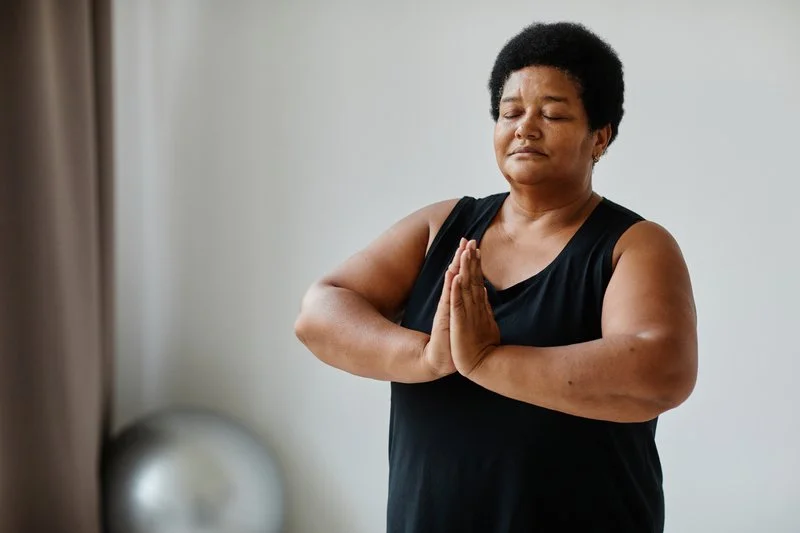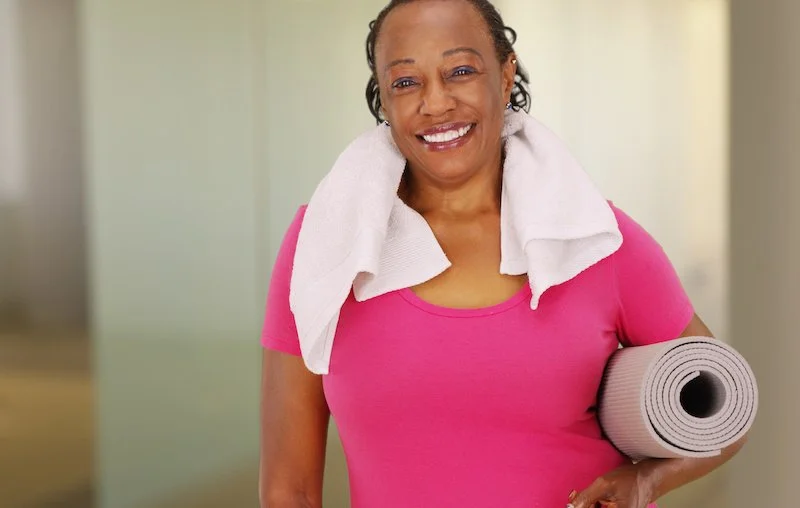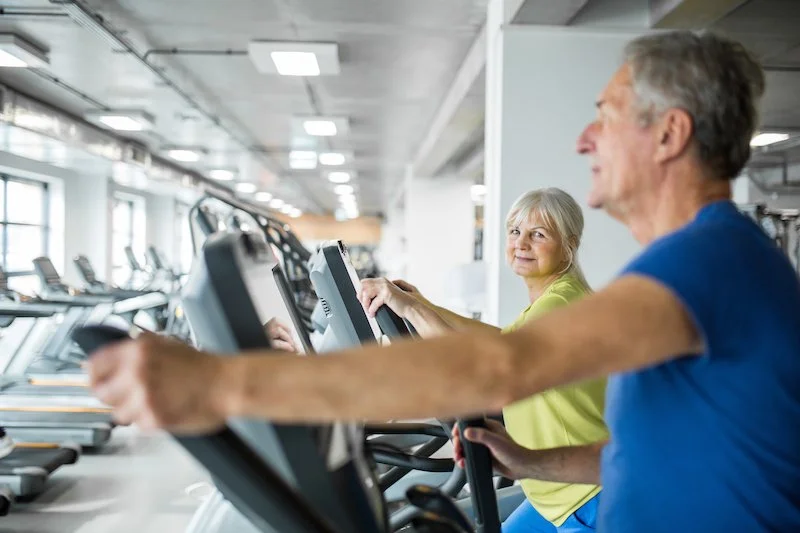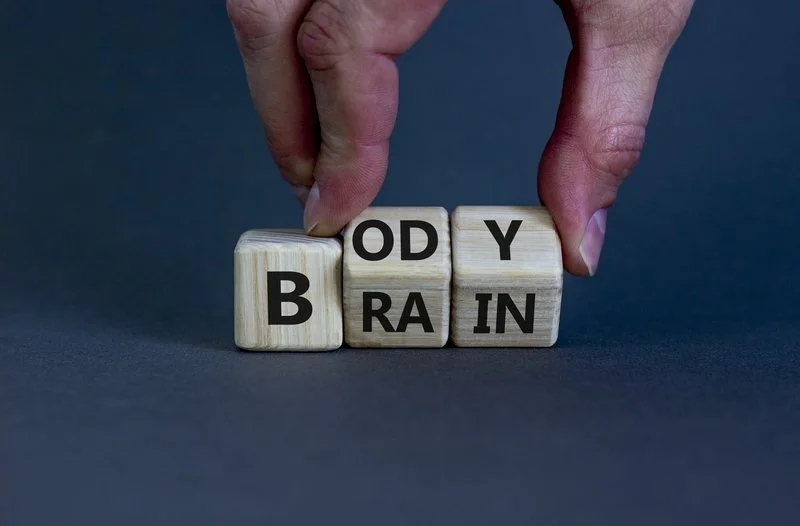Some people are motivated to get strong and stay fit by one or two reasons. Among the most common for people over 50? Playing with grandkids, traveling, maintaining physical autonomy, and continuing to enjoy their favorite activities. Susan Kupferberg, 65, has all of those and more motivating her quest to get strong and stay fit.
Read MoreFalling is a major fear about growing older – and it’s a leading cause of injury and death among mature adults. It's also a common problem for people who don't yet consider themselves “old” in the traditional sense.
But it is not inevitable. Here are the top five ways to prevent falling, according to fitness, health and aging experts.
With so much pressure to look a certain way (usually thin and young for women), how can we maintain positive self-esteem and health at the same time? Wouldn’t it be nice to be at peace with your body image? Counselor and nutrition expert Nina Manolson says it’s especially difficult for women, and even more so later in life.
Read MoreWe’re halfway through the year, and it’s a great time to assess progress on health, fitness, and other goals you had at the start of 2023. Or… maybe you didn’t have any and are only thinking about creating some goals now. That’s fine! With a new season upon us, we’re here with 23 tips to make this your sunniest yet. Forget regret. Abandon perfection. Embrace consistency!
Read MoreHere’s further proof that exercise is good for us, body and brain alike. In recent months, research has been published showing that exercise is the “top theoretical treatment” for Alzheimer’s disease, aligning with previous research about how it fights dementia. Moderate physical activity among mature women helps lower the risk of cognitive impairment and dementia – again supporting the growing body of evidence that says physical exercise is also among our best defenses against losing mental health.
Read MoreWhat type of grandparent do you want to be? The strong and healthy kind that plays with the grandkids, even learning new sports later in life? Or the frail, retreating kind that sits and watches, instead? Well, we all know which we would rather be: strong and healthy, right? Strength makes all the difference as we age. We all lose muscle as we age unless we practice resistance training to maintain muscle. Without it, we get to the point where we simply can’t do much of anything.
Read MoreAt every stage in life, physical health is tied to mental health. When we feel good physically, we’re more likely to feel good mentally, as well. And with dementia, depression, anxiety, and loneliness higher among people later in life, this is one more reason to get or stay physically fit. The World Health Organization has six tips for good mental health, and May is Mental Health Awareness Month. Four of WHO’s reasons are clearly connected to physical fitness.
Read MoreAfter age 50 or so, many people start to gain weight, develop high blood pressure, and become frailer and weaker by the day. Plus, we have universal fears that getting older means we’ll be likely to fall and develop dementia, losing our independence in life. But what if I told you about a miracle drug that would help you lose weight, manage your blood pressure, and improve your bone density and strength? What if this drug also helped prevent falls and memory loss?
Read MoreParents might tell their kids to correct their posture more to instill pride and project confidence. But good posture is about a lot more at this stage of life. As we age, our bodies are “de-volving” into a more rounded, slumped posture. Not only does that add years to our appearance, but it also contributes to joint and muscle misalignment, which creates bad movement patterns.
Read MoreDid you start the new year with a big fitness goal – like losing weight or going to the gym three times a week? And have you found it hard to stick to it, like so many people do every year? While setting goals can be motivating, it's easy to get discouraged when we don't see immediate progress or face unexpected setbacks. Instead of focusing on specific goals, what if we shifted our attention to the process of improving ourselves every day, one step at a time?
Read MoreWhat’s the secret to a long, happy marriage? For Karl and Susan, who just celebrated 61 years together, it’s a combination of things. Like being kind and thoughtful with each other, while maintaining common interests and enjoying walks on the beach… And keeping the romance alive, with sweet gestures every day, like the way he brings her tea in bed every morning… And … EXERCISE!
Read MoreIndia Bridgette is a professor in the course titled “What’s Possible?” The 61-year-old champion sprinter and former Marine knows it takes discipline to answer that question and to excel at anything. She recently added strength training to that answer, too – for everyone, no matter what age, lifestyle, or fitness goals. Working out with weights has helped her show What’s Possible on the track and in everyday life.
Read MoreAbout new year resolutions, there’s bad news, and then there’s good news. First the bad news: Most of them fail. Now the good news: People over 50 have more life experience and tools to succeed at them. You’re more realistic, focused and balanced.
Read MorePackaged, ultra-processed foods are convenient and tasty. They’re handy to have around the house for the grandkids or for snacking. But they’re not good for us – not for our bodies OR our brains. We’re talking hot dogs, burgers, sausages, cookies, cakes, doughnuts, and the like. You already know they contribute to obesity and other negative physical effects.
Read MoreThe holidays are a great opportunity for “quality time” between grandparents and grandkids. And that includes physical activity.
In fact, all year long, people over 50 say that being strong for their grandchildren is their No. 1 reason for staying fit – or for wanting to get fit in the first place.
Read MoreNobody likes belly fat, but almost everybody struggles with it to some degree. Among all kinds of fat, belly fat is the one that gets the most attention. I am frequently asked to help my training partners lose weight – and often, it’s specifically about the extended, round belly that tends to accumulate after 50 or so. Here’s the good news: Belly fat isn’t inevitable. We’re here to show you how to exercise and eat right to lose body fat for better health -- and to feel, look, and move better.
Read MoreFor some reason, we all started thinking we had to take 10,000 steps a day for good health. It seemed to take hold when fitness trackers became popular, and we all were talking about “getting my steps in” every day. Well, despite some questions over the years about the validity of that number, new scientific studies say that, indeed, we do need about that many steps a day to get the most health benefit.
Read MoreI love this subject and never get tired of sharing the good news: Scientific evidence keeps showing the link between exercise and a lower risk of developing dementia. One paper published recently in Neurology looked at 38 studies that followed more than 2 million people over at least three years. It found that people who exercised regularly had a 17 percent less chance of getting dementia, compared to people who did not.
Read MoreRemember in school when the health teacher warned you about drinking? She probably said something like: Alcohol kills brain cells, and YOU NEVER GET NEW BRAIN CELLS. Scary stuff. Well, guess what? It’s not true about never getting new brain cells – although the choices you make in life affect your brain health and even your risk of developing Alzheimer’s disease and other forms of dementia.
Read More



















